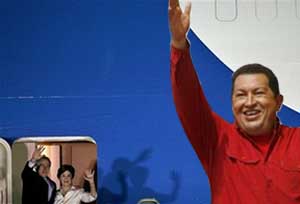March 12, 2007 (the date of publication in Russian)
Alexei Chichkin
THE MONROE DOCTRINE, AND THE SAN MARTIN – BOLIVAR PROJECT
Chavez gains more success in Argentina than Bush in Brazil
 George W. Bush's trip across Latin America was designed as a new attempt to improve the image of Washington in the region where the anti-US sentiment is getting stronger and stronger. Special hopes were associated with the visit to Brazil, which had been regarded as Washington's key partner in Ibero-America for the whole of the XX century.
George W. Bush's trip across Latin America was designed as a new attempt to improve the image of Washington in the region where the anti-US sentiment is getting stronger and stronger. Special hopes were associated with the visit to Brazil, which had been regarded as Washington's key partner in Ibero-America for the whole of the XX century.
The ascent of President Luis Ignacio Lula da Silva in 2003 was perceived in the United States with imperial hubris. At that time, Brazil underwent a number of discriminatory measures. In his turn, Lula ordered to finger-print all US citizens, arriving in Brazil, regardless from the losses of tourist business.
Several years passed before the United States realized that the decisive period of adjustment to Brazil's new political reality was gone. Bush tried to make up leeway but failed. At the meeting in Sao Paulo, accompanied with chants of a 15-thousand anti-US demonstration, Bush managed to sign only one agreement, concerning joint production of alternative energy sources. This deal is favorable mostly for the Brazilian side. By 2010, the government of this country is going to increase annual exports of ethanol from 3 to 8 million litres, by means of expanding sugar cane estates. Military strategic partnership was not discussed. Even the issue of resumption of Rio de Janeiro Pact, signed during World War II and regulating cooperation of the Americas in military sphere, was omitted.
It is noteworthy that Venezuela's president Hugo Chavez increased his political activity in South America simultaneously with his key political opponent George W. Bush. While the US President was trying to flirt with Brazil, Chavez enjoyed a much friendlier acceptance in Argentina. Addressing the guest, Argentina's President Nestor Kirchner claimed that Argentina and Venezuela are committed for expansion of the strategic framework of cooperation, in order to guarantee independence of both countries from the IMF and similar institutions.
The dialogue of Chavez and Kirchner appeared to be much more fruitful than Bush's diplomacy in Rio. Argentina and Venezuela signed eleven agreements on cooperation in various fields. In particular, the sides confirmed their intention to establish a "gas OPEC of Ibero-America" in partnership with Bolivia and Ecuador, in order to jointly finance projects of national development and integration in the region. Hugo Chavez characterized the agreements as "one more step ahead on the way of implementation of the San Martin – Bolivar Project (General San Martin was the leader of the national liberation movement against Spanish reign in Argentina and Chile).
The propagandist element of Chavez's visit to Buenos Aires was of equal importance. Venezuela's President not only successfully held the talks but also addressed a huge anti-US manifestation in Argentina's capital. "Gringo go home!" the Venezuelan leader chanted, echoed by a roar of a 20,000 crowd. "I believe that the main purpose of Bush's arrival was to clean the face of the empire. But it is too late", Chavez told Argentina's TV channels.
Still, peaceful diplomacy has never dominated in the US policy toolkit in Ibero-America. Today, as well as in the Cold War times, Uncle Sam is trying to use old methods of military economic pressure. Recently, a group of leaders of Ibero-American leftist parties published a joint statement in Georgetown, Guyana. The document warns about the intention of the United States to surround Brazil, Venezuela, Nicaragua, and Ecuador with military and intelligence bases, reproducing the 1945 effort against the USSR. The authors report that the US bases, deployed in Puerto Rico, Virgin Isles, Paraguay, Chile and a number of islands along the coastline of Brazil, are put on high alert.
These statements are left without any comment by the official Washington. According to other sources, the United States has expanded its military presence also in the Eastern Samoa and in Polynesia, which is still regarded as Washington's Pacific bascule barrier for South America.
Fearing of Brazil's rapprochement with the "Chavez axis", the United States also imposes economic measures of pressure. In particular, a number of US companies abandoned the 400 km railroad project, supposed to connect the south-west of Brazilian Amazonia with Caliao port in Peru. The pretext for the pullout was the decision of the consortium, including companies from France, China, Venezuela and Cuba, to invite also Bolivia and Ecuador into the project.
Number of shows: 1271
 ENG
ENG 

 ENG
ENG 
